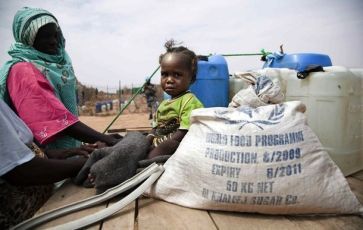Groups urge U.S. gov’t to fund Sudan’s humanitarian needs from BNP-Paribas money
October 1, 2015 (WASHINGTON) – Rights activists, Sudan advocates and Sudanese diaspora leaders called on the U. S. Justice Department to use without delay part of the nearly nine billion dollars penalty paid by the BNP-Paribas (BNPP) to fund humanitarian aid in Sudan.

In order to sensitize the American authorities to respond swiftly to this request, 110 signatories from right groups and prominent activists on Thursday issued a statement supporting the proposal and underlined the need to disburse funds quickly as they fear that the Justice Department process may take years.
“Because the humanitarian needs for Sudanese refugees and IDPs are so enormous and urgent, it is essential that the Department of Justice move as expeditiously as possible to initiate the Sudan Community Compensation Program,” said Eric Reeves, a noted Sudan researcher and one of the authors of the proposal.
In January 2015, United Nations agencies estimate there are about 5.4 million people in need for humanitarian assistance in Sudan, with 2.5 million in Darfur.
Also, UN OCHA says there is a huge funding shortfall for humanitarian activities for displaced persons in Sudan as only 39% of the $1.04 billion requested has been received.
On September 1, 2015, nine Congressmen sent a letter to Attorney General Lynch asking that BNPP funds be used to supplement humanitarian assistance for Sudanese refugees and IDPs.
The US legal authorities said that BNP essentially functioned as the “central bank for the government of Sudan”. Accordingly, in June 2014, a Judge sentenced the French bank to pay $8.83 billion and pay a $140 million fine.
Also, the Justice Department at the time said it was “exploring ways to use these forfeited funds to compensate individuals harmed by the sanctioned regimes of Sudan, Cuba, and Iran.”
But it has not yet indicated how long it will take to make a decision about how the available compensation funds may be used.
(ST)
